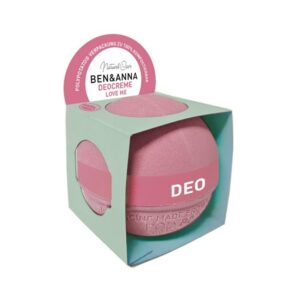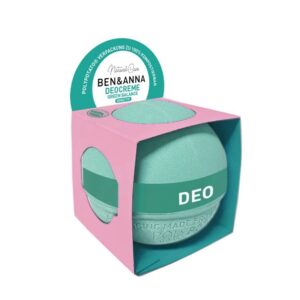
Sustainable brand Ben & Anna has launched a new range of products packaged in innovative environmentally-friendly poly potato packaging.
This world-first potato packaging is 100 per cent natural, fully compostable and is made with potato starch (a by-product of the potato industry), plus paper and natural fibres.
The new range consists of two natural deodorant creams, Love Me and Green Balance, which the brand claims are ‘the most sustainable deodorant on the market’ due to being packaged in the new poly potato packaging.
The new deodorant creams offer a plastic-free alternative to conventional deodorants and feature natural ingredients such as shea butter and nourishing oils, which gently care for your armpits.
 Love Me – with exotic floral fragrance
Love Me – with exotic floral fragrance
The exotic floral fragrance of Love Me enchants your senses. The unique formula contains only finely ground bicarbonate of soda, which naturally reduces germs and bacteria to effectively prevent odour formation. This natural effectiveness ensures that you are reliably protected from moisture and unpleasant odours.
Love Me is not only characterised by its effectiveness, but also by its light, creamy texture that is absorbed without leaving any residue. Nourishing shea butter and valuable vegetable oils pamper your armpit skin with a delicate, creamy consistency that is neither greasy nor sticky.
 Green Balance – for sensitive skin
Green Balance – for sensitive skin
This extraordinary deodorant combines softness and freshness to create a refresh for the senses. Thanks to the active ingredient magnesium complex, Green Balance is characterised by its gentle and effective prevention of odour, even on sensitive skin.
The light cream is absorbed without leaving any residue or stickiness and leaves a feeling of freshness and cleanliness. Combined with nourishing ingredients such as shea butter and valuable vegetable oils, your skin is pampered and moisturised.
About Ben & Anna
Ben & Anna is a certified cruelty-free and vegan natural beauty brand created in 2017. As passionate vegans they set out to create a brand that was cruelty-free, vegan, natural and sustainable. Their products are certified by NATRUE as containing natural ingredients which are not only kind to the skin but the planet too. They support creative projects to make our world more liveable and healthier for everyone. Full range information available online at www.benandanna.uk
Both deodorants are 40g and have an RRP of £8.95. Available to order now from Pravera Ltd, visit www.praveratrade.co.uk or email trade@pravera.co.uk.

British brand ORGANii has launched a new SPF 30 mineral sun lotion, which is certified natural and organic and is suitable for sensitive skin.
The new SPF 30 Sun Lotion blends easily into the skin and offers instant protection from harmful UVA and UVB rays, compared to chemical-based sunscreens that need to be rubbed in and take around 20 minutes before they shield the skin.
The medium-protection formula has a fluid consistency so there is no residue left on the skin after application, while protecting your skin from the UVA and UVB rays naturally and safely. Non-nano zinc oxide and non-nano titanium dioxide sit on top of the skin, reflecting the sun’s rays and creating a protective barrier. The sun lotion is also enriched with organic aloe vera, green tea leaf extract and coconut oil that will leave your skin soft and supple.
The ORGANii Sun Range consist of four products, three SPFs and an after sun cream, all of which are AIAB certified organic, suitable for vegans and do not contain colours, fragrances, artificial preservatives (like parabens) or chemical synthesised sun protection boosters.
The ORGANii SPF 30 Sun Lotion is available now from Pravera Ltd, RRP £19.95, please email trade@pravera.co.uk for further information.
Why is a mineral sunscreen better?
Traditional conventional sunscreens use chemical ingredients designed to absorb sun rays and release their energy as heat. Such ingredients can cause skin irritation, and many of these chemicals have also been linked to disrupting the endocrine system, which regulates the hormone function in the body.
Perfect for sensitive skin, including babies’, the ORGANii sun care range offers a safer and gentler alternative. It uses organic ingredients such as karanja oil with titanium dioxide and zinc oxide that creates a protective shield on the skin, scattering and reflecting UVA and UVB rays.
Whilst a chemical-based sun cream only works 20 minutes after application, a mineral sun product works instantly as it creates a barrier between the sun and the skin rather than being absorbed into the epidermis.

News that inflation has fallen to 3.2 per cent has been welcomed but warnings remain of the cost pressures still facing UK households.
The latest CPI inflation figures for March have revealed that inflation fell to 3.2 per cent, with food inflation falling one percentage point to four per cent.
Responding to the figures, Shona Goudie, Policy and Advocacy Manager at The Food Foundation, cautioned: “As inflation continues to ease, it is important not to lose sight of the struggles that many people across the UK are still experiencing. Even though we are seeing lower inflation figures, this does not necessarily mean that prices are coming down, but instead that prices are increasing more slowly. The Food Foundation has been tracking food prices on our Basic Basket Tracker for two years showing that despite inflation falling, this has not yet been reflected in the cost of a weekly shop. In fact, since we began tracking, the price of a weekly shop has increased by approximately 25 per cent. Concerningly, the price of the vegetables in the basket has increased by more than the average, up by 39 per cent.
“Our recent food insecurity data showed that eight million adults live in households experiencing food insecurity in January 2024 and 44 per cent of households who had experienced food insecurity reported to have purchased less veg. The price of food remains a significant barrier to eating the healthy diet that everyone deserves. This is why we are calling on all political parties to commit to ensuring that everyone in the UK is able to access and afford healthy food as we approach the next general election.”
Also commenting was Kris Hamer, Director of Insight of the British Retail Consortium, who said: “Cost pressures on households eased in March as inflation dropped to its lowest level since September 2021. Energy prices remain deflationary, while falling inflation rates for clothing and household furniture and equipment were also key in driving down the headline figure. Consumers benefitted as food inflation fell once again, marking 12 months of consecutive drops. This was helped by falls in the cost of a roast dinner as the price of beef, pork and potatoes all fell.
“As some cost pressures in the supply chain begin to ease, retailers have worked hard to pass on savings where they can and offering their customers the best value for money. In a year of elections, politicians, both locally and nationally, must recognise retail’s role in the economy, providing jobs and investment in every corner of the country and helping deliver government policy through its scale and reach. Competition between retailers has played a key role in bringing down inflation for the public and it is vital that politicians consider the inflationary impact of new policies which might reverse this progress and result in higher prices for consumers in the long run.”
And Karen Betts, CEO at The Food and Drink Federation, also commented “Food and drink price inflation fell again in March, to four per cent from five per cent in February. This corresponds to input price inflation that manufacturers experience, which also continues to ease. This is good news for consumers – with food and drink price inflation rates now much lower than they were a year ago and with some prices in shops falling. However, risks remain, including the increasing instance of extreme weather, which is impacting agriculture globally. This has been very visible in the UK in recent weeks with this winter’s wet weather causing widespread flooding on farmland. Inevitably, lower or poorer crop yields caused by bad weather have the ability to impact food prices.
“In this context, we welcome the Prime Minister’s intention to hold another farm to fork summit at No 10 next month. Food security should be a focus of this, and how all parts of the food system work together – and with government – to ensure the UK has a secure supply of good quality food and drink. A central part of this is regulation, and ensuring this fosters investment in the UK, including in innovation and food science. Unfortunately, current government plans for ‘not for EU’ labelling will have the opposite effect, as will current government plans for Forest Risk Commodity regulations, where industry want the same outcome as government, but current proposals are not well designed and will create unnecessary burdens for supply chains. Both could lead to a disinvestment in UK food and drink over time. We hope the summit will help to resolve problems such as these with forward-looking solutions that are well within our reach.”